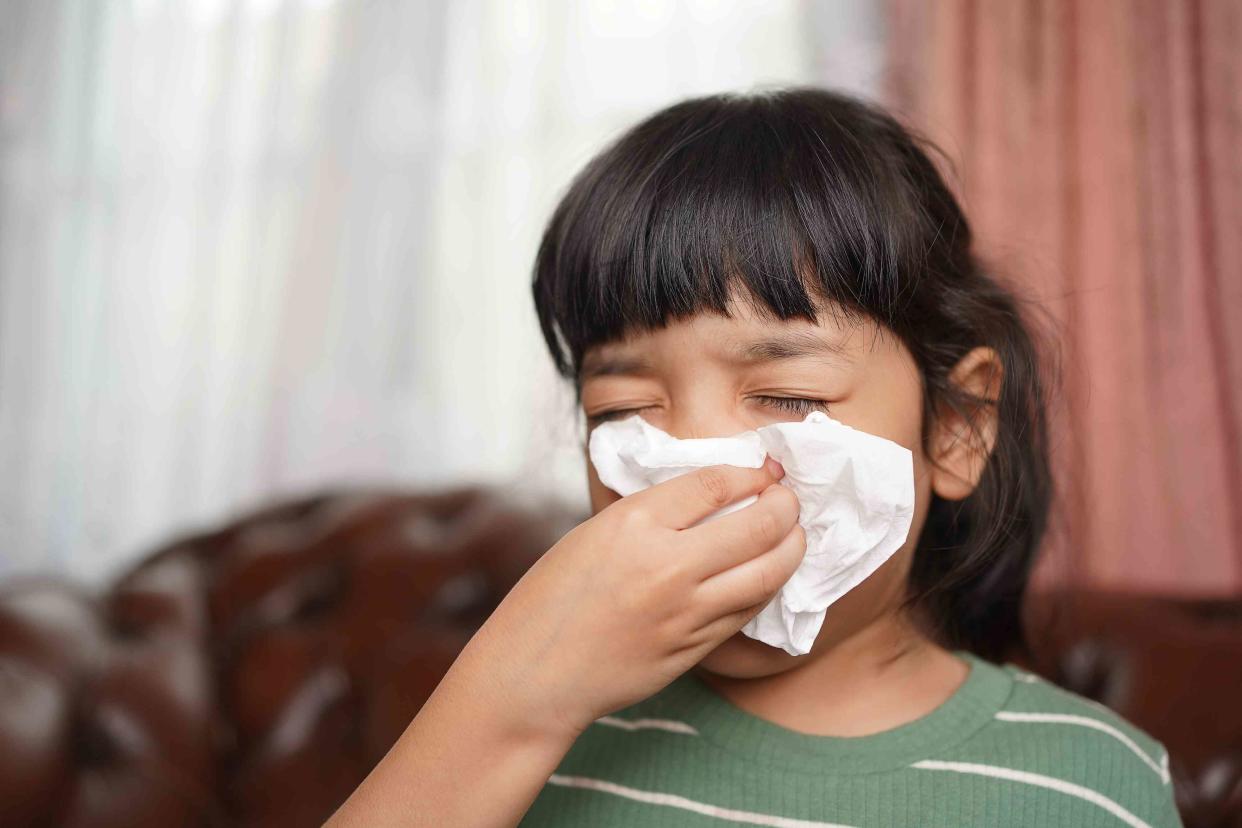Are Sinus Infections Contagious?

Narisara Nami / Getty Images
Medically reviewed by Brian H. Wetchler, DO
Sinus infections (sinusitis) are usually caused by inflammation or irritation of the sinus cavities due to viruses or bacteria. They develop independently or alongside another respiratory infection. Sinus infections are one of the most common ailments people see a healthcare provider for. Treatment and the spread of sinusitis depend on the underlying cause.
This article will discuss how and when sinus infections are contagious, the difference between viral and bacterial sinus infections, and how to tell the two apart.

Narisara Nami / Getty Images
Related:Ear, Nose, and Throat Conditions (ENT)
Contagiousness of Sinus Infections Depends on the Cause
Most sinus infections are caused by a viral upper respiratory illness, including the following viruses:
Bacteria can cause sinusitis, too. Some sinus infections or colds that start from a virus can lead to an overgrowth of bacteria in the sinus cavities, causing acute bacterial sinusitis. Common bacterial sinus infections include:
Anaerobic bacteria
Some bacterial sinus infections can result in multiple types of bacteria, complicating treatment.
How Long Are Sinus Infections Contagious?
Bacterial sinusitis develops from an overgrowth of bacteria in your body. People with weakened immune systems or preexisting nasal symptoms are at risk of developing bacterial sinus infections, but they aren't usually spread from person to person.
Viral sinus infections are contagious. How long you are contagious with one of these infections depends on various factors, including:
The type of virus
The presence of symptoms
The presence of a fever
People are typically sick and, therefore, contagious, with viral infections between three and seven days.
If a viral sinus infection develops into a bacterial one, it's probably not contagious. However, it may be challenging to determine exactly when your sinusitis progressed from viral to bacterial.
You can also develop sinus infections because of structural problems in your nose or the bone structure in your face, as well as from allergens and irritants. Neither of these forms of sinusitis is contagious.
You don't always need to see a healthcare provider for a sinus infection. However, if you experience the following signs, seek treatment:
Severe headache or facial pain
Symptoms that get worse after initially getting better
Symptoms that don't improve or get worse after 10 days
A fever that lasts more than three or four days
Related:Incubation Periods of Childhood Diseases
How Sinus Infections Are Spread
Viral sinus infections are usually spread just like colds—through contact with the respiratory particles from the cough, sneeze, or even breath of an infected person.
Bacterial infections can also spread from contact with contaminated substances, but in the case of sinus infections, bacterial sinusitis isn't usually transmitted from person to person. Instead, it develops from an overgrowth of the bacteria that are naturally found in your body or as a complication from another viral, allergic, or fungal infection.
In many cases, an underlying issue causes a buildup of fluid or air in your sinus cavities. This fluid or air gets trapped and ends up growing bacteria that cause the infection. Most of these infections are self-limiting, meaning they don't spread to other parts of the body or other people.
Are You Still Contagious While Treating a Sinus Infection?
As with most viral illnesses, you can usually spread a viral sinus infection to others for as long as you experience symptoms. Viral sinus infections typically clear up in about a week with supportive treatments like nasal decongestants and pain relievers.
A provider will only consider antibiotics for bacterial sinus infections lasting 10 days or longer. Antibiotics are ineffective in treating a viral sinus infection unless it has developed a secondary bacterial infection.
Quarantine isn't recommended for every type of viral infection, but staying home and limiting contact with others when sick is generally a good idea. Contact with specific populations like older adults, babies, and people with weakened immune systems carry a higher risk of infection for those people, so practice extra caution if you are around anyone who falls into these categories.
How to Keep a Sinus Infection From Spreading to Others
The best way to keep from spreading any kind of infection, including sinus infections, is to stay home when you are sick and avoid contact with people you know are ill or are displaying symptoms of an illness.
Common symptoms of sinus infections can include the following:
A runny or stuffy nose
Facial pain or pressure
Headache
Sore throat
Cough
If you or someone around you has these symptoms, maintain physical distance or use a barrier like a face mask to reduce the risk of transmission. Frequent handwashing, using a humidifier in your home, and staying up-to-date on vaccines for common viral and bacterial illnesses can also help you prevent spreading—or catching—a bug that can cause a sinus infection.
Related:How Long Do Colds Last?
Summary
Viral sinus infections are contagious because the virus that caused them can be passed on to others. However, it is possible for viral sinusitis to turn into bacterial sinusitis, especially if you are sick for longer than ten days. When you know that a virus has caused your symptoms, you are considered contagious until your symptoms have resolved and you are fever-free. Unfortunately, it's hard to tell the difference between a viral and bacterial infection.
A healthcare provider probably won't order tests to investigate unless you have been sick for a long time or get frequent sinus infections. Avoid contact with others and practice hand hygiene to avoid spreading the virus that caused your sinus infection.

